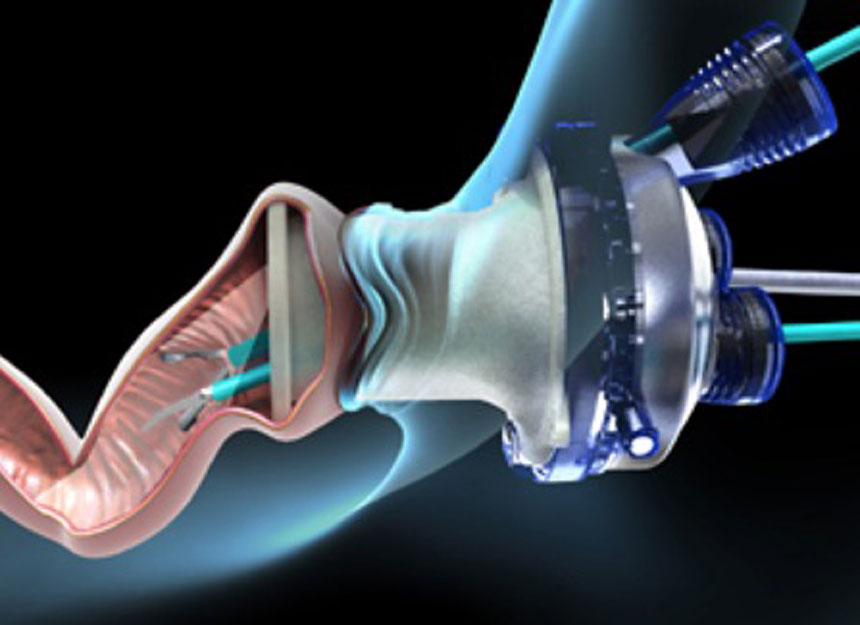Treatments – Colon and Rectum
Transanal Minimally Invasive Surgery (TAMIS)
TAMIS is a minimally invasive procedure used for the removal of polyps or early bowel cancers from the lower part of the bowel (rectum). The rectal lesions are removed in a single piece in order to analyse them under the microscope and reach a diagnosis and is also offered as the ultimate treatment for early rectal cancer. It can also be used to repair an abnormal defect in the rectum called a fistula. The procedure takes place under general anaesthetic and involves the use of a special platform to perform keyhole surgery through the back passage using small specialised surgical instruments. The rectum is filled with gas in order to be able to see the lesion and once the lesion is removed the defect in the bowel wall is usually closed internally with stitches.

Benefits of procedure
Compared to radical surgery TAMIS:
- avoids major colorectal surgery with its serious complications,
- no external incisions,
- avoids a stoma,
- less painful,
- faster recovery and requires fewer days spent in hospital.
Compared to polyp removal with endoscopy, TAMIS removes the lesion in one piece rather than in many pieces thus:
- potentially avoids the need for further surgery if a small cancer is detected
- potentially has a smaller risk of the polyp returning
Before the procedure
Prior to the procedure the bowel needs to be cleared with the use of strong laxatives or enemas. You will be advised prior to the procedure which is the case. If you are having the strong laxatives you will be given information on following a special diet and when to use the laxatives to empty your bowel 24 hours prior to your procedure. These may make you feel slightly sick but they are needed in order to ensure that the bowel is clean and good views of your bowel lining can be obtained and the procedure performed.
Recovery
After the procedure you will wake up in a hospital room. TAMIS may be performed as a day procedure but most time it will require 1 or 2 nights spent in hospital. You are typically expected to go home once you are eating and drinking, are able to manage the pain and walk unaided and have passed some urine. On discharge you will be given some antibiotics and laxatives to take for 2 weeks. It normally takes a few days to fully recover from a TAMIS procedure and return back to work but it varies from person to person and depends on their general health and the nature of their work. Once the removed specimen has been analysed under a microscope you will be seen in clinic and further management of your condition will be discussed. If the diagnosis is one of a cancer, further investigations may be required and depending on how advanced it is further treatment in the form of either radiotherapy or more major surgery may be required.
Risks of procedure
A TAMIS operation is generally a safe procedure when performed by a specially trained colorectal surgeon. The risks include complications common to all surgical procedures such as infection, bleeding, blood clots, heart problems, pneumonia, urinary retention, and anaesthetic risks. Complications specific to this operation include the risk of mild temporary incontinence to flatus, a risk of entering the abdominal cavity through the rectum (1 in 100) requiring more major surgery to repair this either through keyhole surgery or through open surgery with the potential of a stoma and a risk of forming a local collection (1 in 1000). Furthermore, there is a small risk of injury to nearby organs such as the vagina in women or the tube draining the bladder (urethra) in men (1 in 1000) and a risk of narrowing of the bowel which can be dilated through the back passage. All of the above risks are less when performed by an experienced surgeon and should be balanced against the risks of undergoing more major surgery or not undergoing surgery any surgery at all and the consequences of that. All of the relevant information will be discussed with you at an individual basis.
Need to contact us or book an appointment?
Disclaimer
The information relating to general and colorectal disorders and their treatments given on this website is not complete and is not intended as a substitute for a consultation with your doctor. Always seek medical advice from your doctor before making a decision about any of the conditions and/or treatments mentioned on this website.
© Dr Georgios Markides
Contact Information
You can always contact our Clinic for booking appointments and other useful information:
Dr. Georgios Markides,
Consultant General & Colorectal Surgeon
APEX Building, 47 Andreas Avraamides Str., 2024 Strovolos, Nicosia, Cyprus
+357-22-282008
